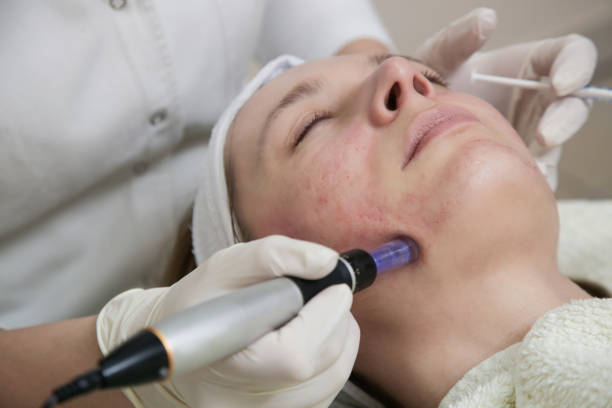Microneedling is generally safe for many people, but there are certain individuals who should avoid the procedure or approach it with caution. Here are some groups who should avoid microneedling:
- Active Skin Infections: Individuals with active acne, herpes simplex (cold sores), or other skin infections should avoid microneedling until the infection has completely cleared.
- Chronic Skin Conditions: Those with chronic skin conditions such as eczema, psoriasis, or rosacea should avoid microneedling as it can exacerbate these conditions.
- Keloid or Hypertrophic Scarring: People prone to keloid scars or hypertrophic scars should avoid microneedling as it can potentially worsen scarring.
- Skin Cancer: Individuals with a history of skin cancer or who currently have skin cancer should avoid microneedling.
- Recent Surgery or Radiation Therapy: Those who have recently undergone surgery, radiation therapy, or have open wounds in the treatment area should avoid microneedling.
- Pregnancy: Pregnant women are advised to avoid microneedling due to the potential risks associated with the procedure.
- Blood Disorders or Anticoagulant Use: Individuals with blood disorders or those taking anticoagulant medications (blood thinners) should avoid microneedling due to an increased risk of bleeding and bruising.
- Immune Suppression: Those with compromised immune systems or those taking immunosuppressive medications should avoid microneedling as it may increase the risk of infection.
- Severe or Uncontrolled Diabetes: People with severe or uncontrolled diabetes should avoid microneedling as their skin may have difficulty healing properly.
It’s important for anyone considering microneedling to consult with a dermatologist or healthcare professional to determine if the procedure is safe and appropriate for their specific skin type and health condition.

What skin types are not suitable for microneedling?
While microneedling can be beneficial for a wide range of skin types, certain skin types may not be suitable for the procedure. Here are some skin types that may need to avoid microneedling or approach it with caution:
- Highly Sensitive Skin: Individuals with very sensitive skin may experience excessive irritation, redness, and discomfort from microneedling. It’s important to assess the sensitivity level before proceeding.
- Active Acne or Inflamed Skin: Those with active acne, cystic acne, or inflamed skin should avoid microneedling as it can aggravate the condition and spread bacteria, potentially worsening the acne.
- Eczema or Psoriasis-Prone Skin: People with conditions like eczema or psoriasis may find that microneedling exacerbates their skin issues, leading to increased inflammation and discomfort.
- Rosacea-Prone Skin: Individuals with rosacea should be cautious as microneedling can cause flare-ups and increase redness and inflammation.
- Keloid or Hypertrophic Scar-Prone Skin: Those prone to keloid or hypertrophic scarring should avoid microneedling because it can induce more scarring.
- Thin or Fragile Skin: Individuals with very thin or fragile skin, such as the elderly or those with certain medical conditions, may find microneedling too harsh and potentially damaging.
- Sunburned Skin: Those with recent sunburn should wait until their skin has fully healed before considering microneedling, as the treatment can further irritate and damage already compromised skin.
- Hyperpigmented Skin: While microneedling can be used to treat hyperpigmentation, those prone to post-inflammatory hyperpigmentation (PIH) should be cautious, as the procedure can sometimes cause additional pigmentation issues.
Before undergoing microneedling, it’s crucial for individuals to have a thorough consultation with a dermatologist or qualified skincare professional who can evaluate their skin type and condition to determine if microneedling is a safe and effective option for them.
